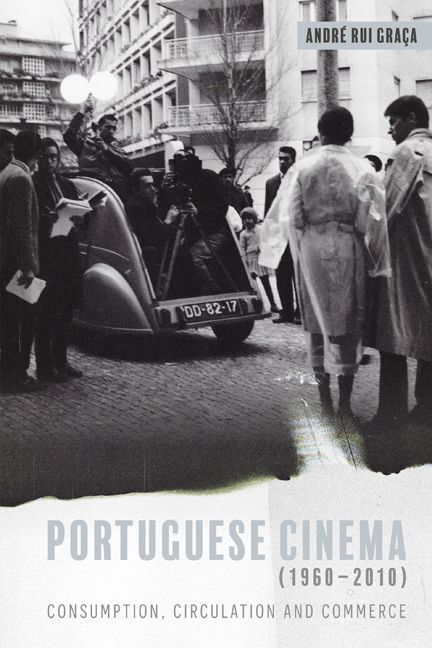Book contents
- Frontmatter
- Contents
- List of Illustrations
- Foreword
- Preface
- List of Abbreviations
- Introduction
- 1 The ‘Unsuccess’ of a National Cinema
- 2 Spectators and Contrasts in Culture
- 3 Visibility, Artistic Prestige, and Circulation
- 4 Portuguese Cinema Laws (1971–2006)
- Conclusion
- Appendix 1
- Appendix 2
- Bibliography
- Index
4 - Portuguese Cinema Laws (1971–2006)
Published online by Cambridge University Press: 06 April 2021
- Frontmatter
- Contents
- List of Illustrations
- Foreword
- Preface
- List of Abbreviations
- Introduction
- 1 The ‘Unsuccess’ of a National Cinema
- 2 Spectators and Contrasts in Culture
- 3 Visibility, Artistic Prestige, and Circulation
- 4 Portuguese Cinema Laws (1971–2006)
- Conclusion
- Appendix 1
- Appendix 2
- Bibliography
- Index
Summary
Cinema as a cultural and economic activity has been regulated in Portugal since 1948 when the first cinema law came into effect. Furthermore, cinematographic practice, understood here in its broader sense, has been highly dependent on governmental support to subsist. Thus, any regulation or law concerning the funding system has had a significant impact on the life of Portuguese cinema and its protagonists. This section addresses the development of the legislation in Portugal regarding cinematic practice. It aims to present a critical reading and historical account of the legal documents and actions that have been approved from 1971 onwards. Although some scholars have occasionally commented on the laws and their repercussions, a chronological and critical history of this topic is yet to be written. The following text seeks to fill this gap.
In the first place, it ought to be noted that there has been abundant legislation. Four laws, more than twenty regulatory decrees (including amendments), as well as several other specific statutes and ordinances, attest to the increasingly sophisticated and ever-changing legal framework of cinema. As will be further developed below, many reasons can justify this, as cinema laws encompass, and sometimes can even reflect, diverse elements of the socio-political history of the country: changes of governments with different political sensibilities; adaptation to the entry into the European Economic Community in 1985 and to the Maastricht Treaty in 1992; financial constraints; the need for updates due to new technologies, audiovisual practices, and changing times; and the urge to simplify or synthesise complex and dispersed legislation.
The late 1960s and the 1970s, or the anticipated revolution
It was not surprising that when 25 April came,
we realised that our problems had been resolved before.
The first law of the period under discussion is the 7/71 law approved on 7 December 1971. At that point the Estado Novo regime was still in existence. Unlike most of the legal system, this law was not changed during the revolution or the years immediately preceding it. In fact, it was considered the law of reference throughout the 1980s, only to be revoked in 1993. Similarly, the first regulation of the 7/71 law, decree nº 286/73, was approved on 5 June 1973 (almost eighteen months afterwards) and was in force until 1984.
- Type
- Chapter
- Information
- Portuguese Cinema (1960–2010)Consumption, Circulation and Commerce, pp. 177 - 206Publisher: Boydell & BrewerPrint publication year: 2021



